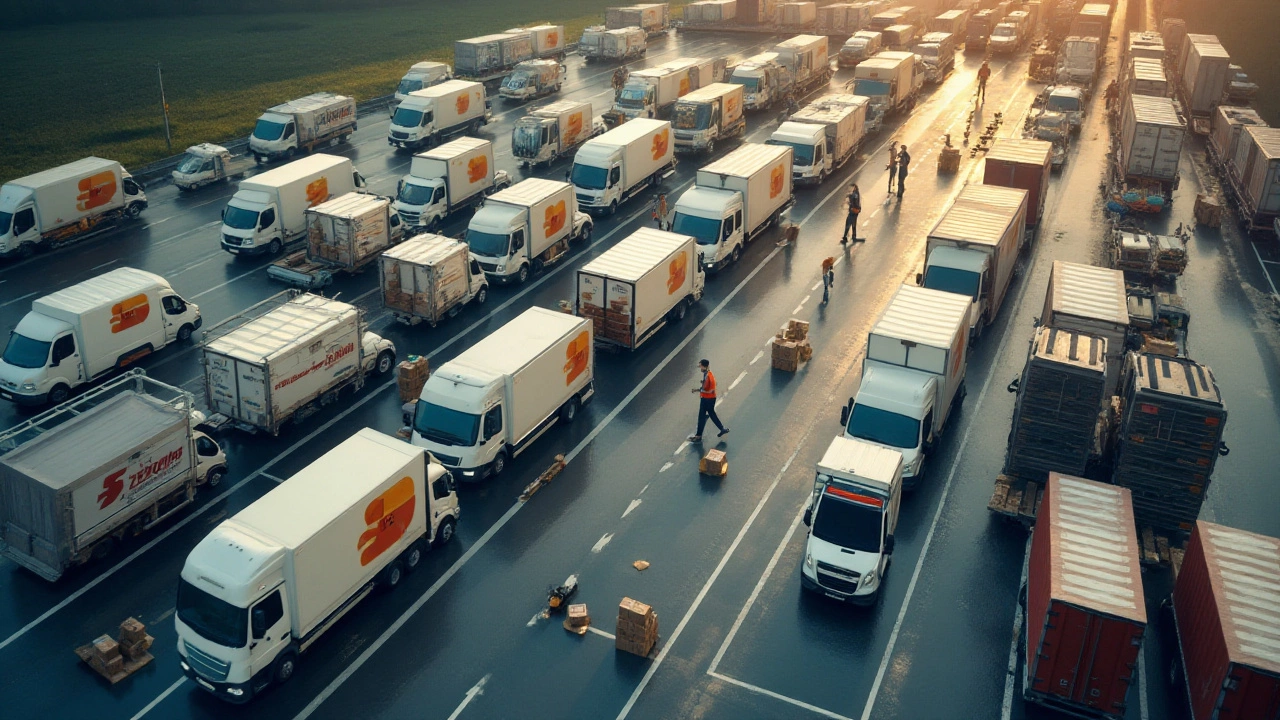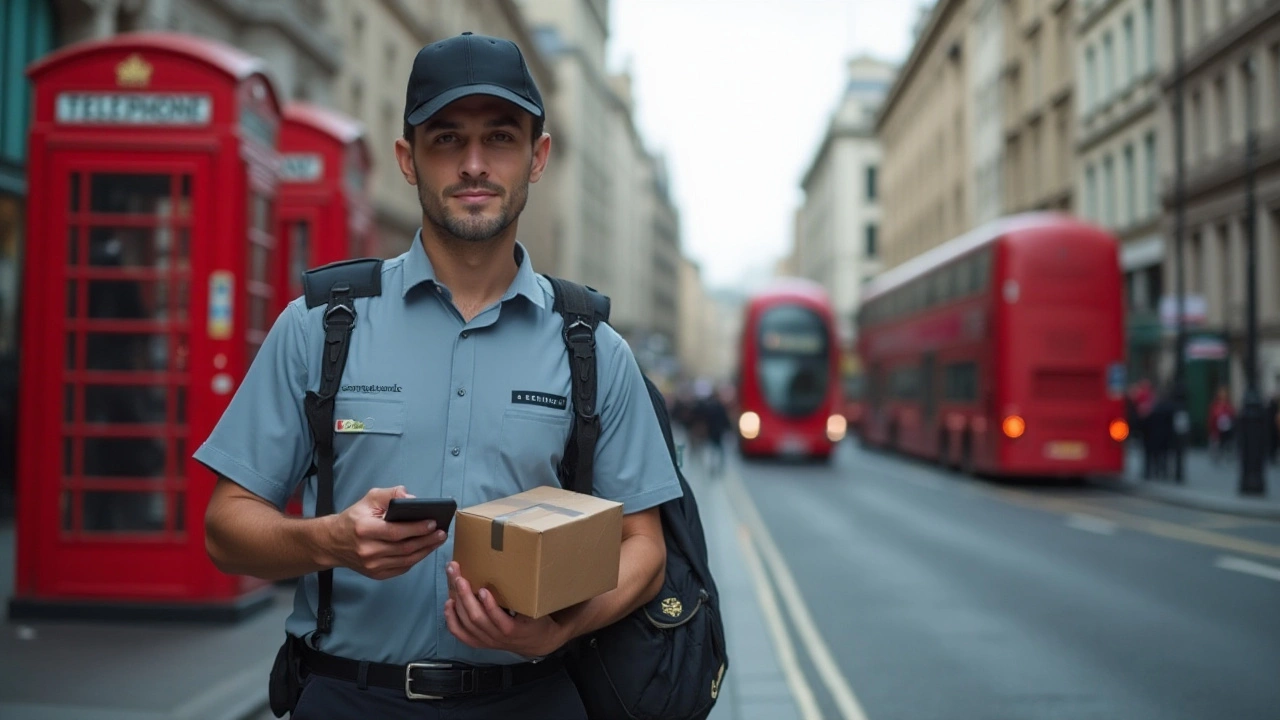Courier services are the unsung heroes of modern life, ensuring that packages, documents, and even foods reach us promptly. Among their many duties, a common query emerges: do couriers deliver cash? Though it might sound like an antiquated practice, the answer has fascinating nuances rooted in policy and practicality.
For those navigating the world of courier services, understanding the complexities of shipping cash can be crucial. From company regulations to safety concerns, numerous factors dictate whether a courier will handle cash. Yet, with advancements in financial technologies, there's more than one way to safely and securely manage transactions when sending or receiving items.
Courier Services Overview
In our swift-paced world, courier services have carved an indispensable niche, transforming the way we think about transporting goods. From the days when hearty folks on horseback carried precious letters across vast terrains to now using drones and automated systems, the evolution has been nothing short of revolutionary. Today, courier services embody efficiency and reliability, going beyond merely delivering parcels. They are logistical juggernauts that play a crucial role in global commerce, ensuring seamless movement across cities, countries, and continents.
One prominent feature of modern couriers is their sheer adaptability. Whether you're a business needing to ship products to customers or an individual sending a bespoke gift across states, courier companies offer a range of services tailored to different needs. Options span from same-day delivery in urban areas to international shipping, and everything in between. They also provide various levels of service, from budget-friendly economy options to premium express deliveries. This means that whatever the demand, there’s likely a service perfectly aligned with your requirements. A key factor in this sector's success is their sophisticated use of technology, streamlining processes via digital tracking tools and optimizing delivery routes.
"The logistical prowess of modern couriers underpins the global economy, ensuring that goods reach their destination swiftly and safely," stated John Rowland, a logistics consultant.
Data and technology form the backbone of today’s courier operations. With advanced GPS tracking and real-time updates, both senders and receivers can monitor the journey of their parcel every step of the way. This transparency helps build trust, crucial in an era where customer expectations for both speed and reliability are at record highs. Additionally, many courier services adopt eco-friendly practices, aiming to reduce their carbon footprint by using electric vehicles and sustainable packaging solutions. Given the growing awareness and responsibility towards environmental sustainability, these initiatives are not just a trend but a necessity for future operations.
In sum, as integral as courier services are, they're part of a larger logistics mosaic that includes ingenious solutions for every conceivable transportation challenge. Whether for personal or professional reasons, knowing the nuances of courier services can demystify the process and guide effective decision-making. The blend of technology, customer-centric options, and an eye towards sustainability ensures that couriers will continue to evolve, remaining pivotal in our interconnected world.

Cash Handling Policies
In the world of courier services, dealing with cash is a topic wrapped in layers of regulations and safety measures. Historically, some couriers did transport cash, a service stemming from times when digital transactions were not as prevalent or trusted. However, as technology advanced, the practices shifted, largely due to security concerns. Many modern companies now have strict policies against handling cash because the risks associated with loss or theft can significantly outweigh the benefits. Understanding these policies requires a dive into both the logistics of courier services and the advances in financial technology that have introduced safer alternatives.
At the heart of cash handling policies is risk management. When a courier service decides not to transport cash, it’s often a preventive measure against the potential for crime. Cash is inherently more tempting as a target for theft compared to other types of shipments. Additionally, moving cash involves meticulous measures to ensure both accountability and safety for the carriers. For instance, insurance costs can skyrocket when cash handling is involved, adding further financial burden to the operation, which can become prohibitive. Interestingly, according to the International Courier Association, only about 5% of all courier transactions still involve any form of physical cash. This statistic highlights a significant industry shift towards digital and cashless transactions.
Some companies, however, have crafted niche services where they offer cash delivery, usually within secure frameworks and often using armored vehicles or specialized personnel. These services cater to specific markets where digital transactions might not be viable yet. It’s important to recognize that these services don’t represent the norm, and they come with their own set of guidelines and costs. Mike Stern, a logistics expert, once mentioned,
"It's not just about moving parcels anymore; it's about moving around trust and responsibility."His words underscore the balancing act couriers face between offering convenient solutions and upholding stringent security protocols.
For those who still require services that involve cash delivery, there are procedures typically in place to protect all parties involved. These include weighing packages, secure seals, and real-time tracking technologies. Such robust procedures reflect efforts to mitigate risks. Even with all these measures, the industry trend is unmistaken – towards digital processes. In an age where mobile wallets and instant transfers have become the norm, reliance on cash is decreasing. The value of transactions done digitally was estimated at $5 trillion in 2023 alone. Such figures add to the perspective of why courier services are progressively distancing themselves from physical money.
The Influence of Technology
Another reason for this trend is the sheer convenience and security that technology brings. With the widespread adoption of online payment platforms, carrying cash is no longer a necessity. This shift is pushing couriers to equip themselves with mobile payment terminals and other digital solutions. By doing so, they can provide instant confirmation of transactions and reduce the risks of errors that are often associated with cash handling. With the inevitable march of progress, courier companies have to embrace these technologies to remain competitive and effective. This aligns their services with what clients now expect – fast, secure, and cashless experiences.
Safety and Security
The handling of cash within courier services involves several layers of safety and security measures. It's not just about picking up a package and dropping it off. When money is involved, the stakes are higher, and service providers know it. They utilize a variety of strategies to ensure that transactions are both secure and traceable. This includes everything from equipping delivery personnel with high-tech GPS systems to using tamper-evident packaging that alerts the sender and receiver if the package has been compromised during transit. These technologies not only track the progress of deliveries but help in the quick recovery of packages if they go astray.
Many companies now provide insurance options for high-value parcels, including those containing currency. This ensures compensation if something unfortunate happens during the delivery. With the rising number of digital payment methods, carrying cash physically is often considered less safe, which is why couriers have developed alternative ways to handle payments. But when cash is necessary, it's typically done with careful attention to the route and timing. Most often, couriers are trained to handle these situations with the utmost discretion and are instructed to never leave cash unattended or visible.
In an effort to reduce potential risks, regulations limit the maximum amount of cash that couriers can transport. Such rules protect both the employee and the company by avoiding high-value targets that might tempt criminal activity. To ensure compliance and bolster their safety protocols, many courier companies run frequent audits and risk assessments. They review current procedures and implement new security technologies as they develop.
It's also interesting to note how technology has enhanced trust within the industry. A survey conducted by the Global Courier Association in 2022 revealed that 67% of courier firms added new security features to their services during that year alone. As technology evolves, so does the ability to safeguard the cash sent through couriers. Digital signatures and security codes further add an invisible layer of protection against unauthorized access to any cash package.
Yet, even with these measures in place, human error can also play a role in breaches of security, which is why regular training and updating employees on best safety practices is critical. A well-educated workforce is one of the best defenses against potential security threats. And finally, many modern courier companies have implemented 24/7 customer service helplines dedicated to addressing and resolving any safety concerns their clients might have. By making support accessible, they reinforce their commitment to reliability and trustworthiness.

Alternative Payment Methods
As the world has evolved with the rise of technology, courier services have had to adapt new payment methods that offer more security and convenience. Today, customers expect seamless transactions, especially when handling sensitive items like cash. Digital payment systems have gained traction, becoming an integral component of how logistics companies operate. Many of these methods eliminate the need for physical cash handling, reducing potential risks for both the courier and the customer.
One widely adopted method is the use of mobile payment applications. Apps like PayPal, Venmo, or Google Pay allow users to transfer money instantly, often with added security features such as encryption and two-factor authentication. These services are not tied to any physical exchange, significantly minimizing the chance of loss or theft. As an added advantage, these platforms can be linked to bank accounts or credit cards, providing users with a traceable and secure payment history. The convenience shines particularly for small businesses or individuals frequently sending or receiving goods.
Parcel delivery services now frequently offer payment options integrated into their online platforms. This might include direct bank transfers where payments can be executed online, safeguarding customer information using robust cybersecurity measures. In fact, a study disclosed that over 70% of online transactions employ some form of encryption, indicating the move towards greater security for digital payments. For customers who still prefer some form of physical acknowledgement, these platforms often provide electronic receipts and tracking features.
For those in regions where mobile payments are less prevalent, digital currency is emerging as an exciting alternative. Cryptocurrencies like Bitcoin or Ethereum offer a decentralized form of payment that can be used worldwide, bypassing traditional banking systems that may have higher fees. While still in infancy and subject to regulation, they present a fascinating glimpse into the potential future of cash delivery and payment methods within the courier sector.
"The integration of digital payments in courier services not only enhances efficiency but also transforms customer engagement," highlights a logistics expert from a leading research institute. This shift toward electronic payments signifies more than just a technological advancement—it's a step towards a more connected and conscientious world.
In essence, exploring these alternative payment methods unveils a realm of opportunities for both couriers and customers alike. By leaning into these technologies, the courier business not only ensures safe practices but also boosts customer satisfaction. As digital landscapes continue to evolve, embracing these flexible payment methods is fast becoming a necessity rather than a choice.


